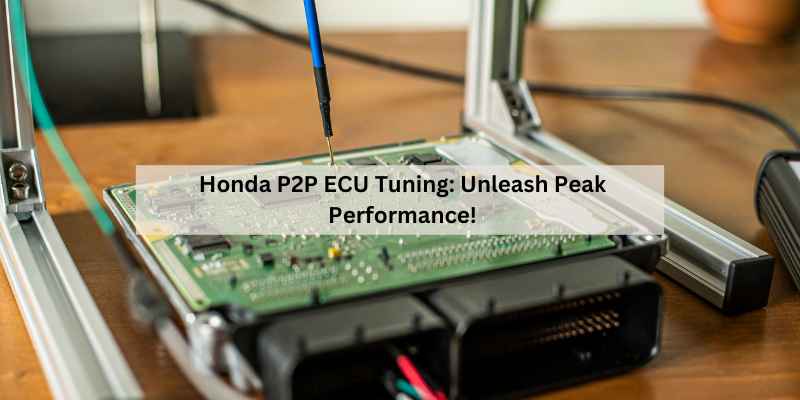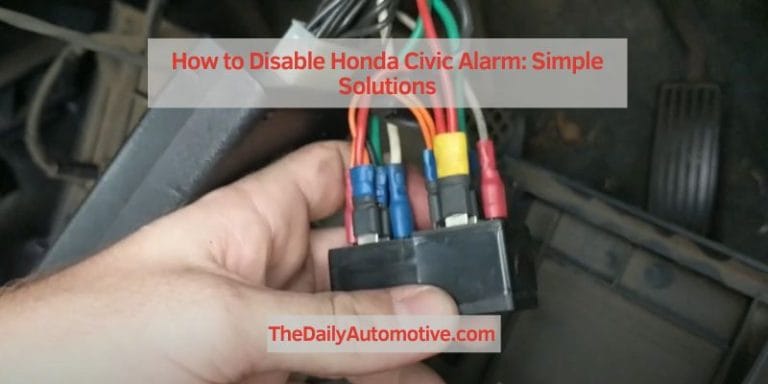Honda P2P ECU Tuning: Unleash Peak Performance!
The Honda P2P ECU is an Engine Control Unit specifically designed for certain Honda models, particularly the Civic series. It manages engine performance by processing data from various sensors to optimize fuel delivery and emissions.
Understanding the Honda P2P ECU is essential for car enthusiasts and mechanics. This component plays a crucial role in managing engine functions, ensuring optimal performance and efficiency. The P2P ECU monitors critical parameters, such as air-fuel mixture and ignition timing, responding to sensor inputs to maintain engine health.
It also aids in diagnosing issues through error codes, which makes troubleshooting easier. Recognizing the importance of this ECU can help owners make informed decisions about repairs or upgrades, ultimately enhancing their vehicle’s performance and longevity.
Introduction To P2p Ecu Tuning
The P2P ECU is a specialized engine control unit for Honda vehicles. It plays a crucial role in managing engine performance and efficiency. Tuning the P2P ECU can enhance your vehicle’s power and responsiveness.
ECU tuning offers several benefits. First, it improves fuel efficiency, allowing you to drive longer distances with less fuel. Second, it can boost horsepower, giving your car better acceleration. Third, it enhances overall driving experience, making your vehicle more enjoyable to drive.
Finally, custom tuning can adapt the engine settings to suit your specific needs. This means whether for racing or daily driving, your Honda will perform at its best.
Identifying Your Honda’s Ecu
Finding your Honda’s ECU can be simple. The Engine Control Unit is usually located under the dashboard, near the driver’s side. Sometimes, it’s behind the glove box or under the hood. Check your owner’s manual for exact locations.
Every ECU has a unique part number. This number helps identify your specific model. Look for a label on the ECU. It usually has a series of numbers and letters. You can search online using this number to find compatible parts.
Knowing the ECU part number is essential for repairs. It ensures you get the correct replacement. Incorrect parts can cause serious engine issues.
Symptoms Of A Failing Honda Ecu
The Check Engine Light is a common sign of a failing Honda ECU. This light illuminates when the ECU detects an issue with engine performance. If the light stays on, it’s a warning of possible ECU or sensor problems.
Performance issues can manifest as poor acceleration, stalling, or rough idling. Drivers may notice a decrease in fuel efficiency or unusual engine noises. These symptoms indicate that immediate attention is needed.
Solutions include running a diagnostic test to pinpoint the problem. Replacing faulty sensors or updating the ECU software can resolve many issues. In some cases, a complete ECU replacement may be necessary.
The Basics Of Ecu Tuning
ECU tuning involves modifying the vehicle’s engine control unit. This process can improve performance and efficiency. It adjusts various settings, including fuel maps and ignition timing. Proper tuning can enhance horsepower and torque.
Common tools for ECU tuning include a laptop with tuning software, an OBD-II scanner, and a cable to connect the ECU. Some tuners use a dynamometer to test vehicle performance. A reliable power supply is essential to avoid disruptions during tuning.
| Tool | Purpose |
|---|---|
| Laptop | Run tuning software |
| OBD-II Scanner | Read and clear trouble codes |
| Cable | Connect ECU to the laptop |
| Dynamometer | Measure power output |
| Power Supply | Ensure stable power during tuning |
Step-by-step Guide To P2p Ecu Tuning
Preparation for tuning is crucial for a successful P2P ECU tuning. Gather all necessary tools, including a laptop and OBD-II cable. Ensure your Honda is parked on a level surface. Disconnect the battery to avoid electrical issues. Take note of your current ECU settings.
Once prepared, check for any existing engine issues. Address them before proceeding with tuning. Keep a record of your vehicle’s specifications. This will help you monitor changes during the tuning process.
The tuning process involves several steps. Start by connecting the OBD-II cable to the vehicle. Then, launch the tuning software on your laptop. Follow the software instructions carefully. Make adjustments based on your desired performance goals.
Always test drive after tuning. Observe how the vehicle responds to changes. Fine-tune settings as needed for optimal performance.
Safety And Precautions
Understanding the risks associated with the Honda P2P ECU is crucial. Faulty ECUs can lead to engine performance issues. Symptoms include a check engine light and poor fuel efficiency. Ignoring these signals can result in serious damage to your vehicle.
To mitigate potential issues, regular maintenance is essential. Check for any warning lights frequently. Always use quality replacement parts to ensure optimal performance. Updating the ECU software can also help improve its functionality. If problems persist, consulting a professional mechanic is advisable.
Optimizing Performance With Advanced Tuning
Fine-tuning the Honda P2P ECU enhances your vehicle’s performance. This involves monitoring various parameters like fuel, air intake, and ignition timing. Adjusting these factors ensures optimal power delivery and efficiency.
Regular data logging helps track the vehicle’s performance over time. It identifies areas needing improvement. With the right tools, adjustments become precise and effective.
Utilizing advanced tuning software allows for real-time changes. This ensures that any modifications lead to noticeable improvements. Always remember to test your vehicle after adjustments for the best results.
Troubleshooting Common Tuning Issues
Common tuning issues with the Honda P2P ECU can lead to performance hiccups. Symptoms may include poor acceleration, erratic idling, or reduced fuel efficiency. Regularly check the check engine light. This light can indicate problems with the ECU or its monitored sensors.
When troubleshooting, start by inspecting the wiring and connectors. Loose or damaged connections can cause major issues. Ensure that the ECU is correctly programmed for your vehicle. Incorrect settings may lead to performance problems.
Seek professional help if issues persist after basic troubleshooting. A qualified technician can perform advanced diagnostics. They have the tools and expertise to identify deeper problems with the ECU or engine.
Resources And Further Reading
Finding the right tools and software for Honda P2P ECU work is crucial. Here are some recommended options:
- Hondata – Offers tuning software for Honda ECUs.
- K-Pro – Advanced ECU tuning for performance upgrades.
- Chrome – Free software for basic ECU tuning.
- EcuFlash – Useful for reflashing ECUs.
For community support, consider these forums and communities:
- Honda-Tech – A popular forum for Honda enthusiasts.
- D-Series.org – Great for D-series engine discussions.
- ClubCivic.com – Focused on Honda Civic models.
- HondaSwap.com – Excellent resource for ECU swaps.
Frequently Asked Questions
What Is The Difference Between P2p And P2e?
P2P (Peer-to-Peer) refers to direct transactions between users, often in file sharing or finance. P2E (Play-to-Earn) involves earning rewards through gameplay in video games. Essentially, P2P focuses on transactions, while P2E emphasizes gaming and earning potential.
How Do I Know If My Honda Ecu Is Bad?
A bad Honda ECU may trigger the check engine light. Other signs include poor fuel efficiency, stalling, or erratic engine behavior. Unresponsive dashboard lights or failure to start can also indicate issues. Professional diagnostics can confirm ECU problems. Regular maintenance helps prevent these issues.
How Do You Tell What Honda Ecu You Have?
To identify your Honda ECU, locate the part number on the unit itself. Check the vehicle application list for compatibility. Alternatively, consult your owner’s manual or a Honda dealership for assistance. This information helps you confirm the specific ECU model installed in your vehicle.
What Hondas Have Obd1 Ecu?
Honda models with OBD1 ECUs include the 1991-1995 Civic, 1992-1995 Accord, 1993-1997 Prelude, and 1990-1993 Integra. These vehicles typically feature a P05, P06, or P07 ECU designation. Always verify your specific model for accurate identification.
Conclusion
Understanding the Honda P2P ECU is essential for optimal vehicle performance. This component plays a crucial role in engine management. With the right knowledge, you can troubleshoot issues effectively. Whether you’re upgrading or replacing, choosing the right ECU can enhance your driving experience.
Stay informed to keep your Honda running smoothly.







